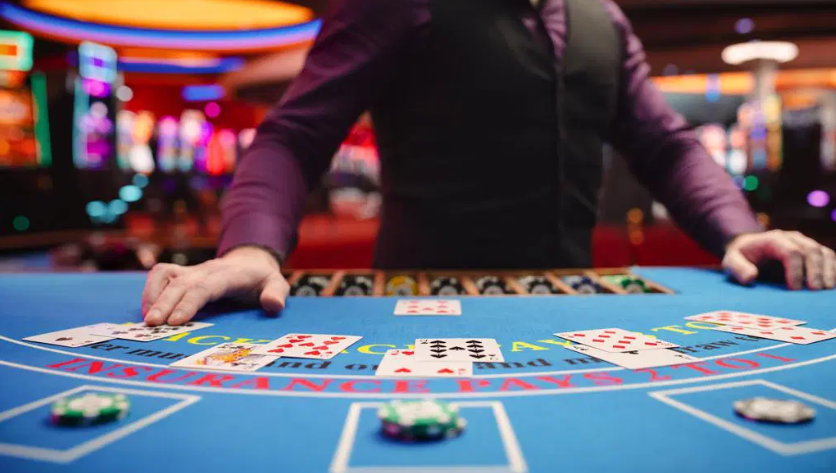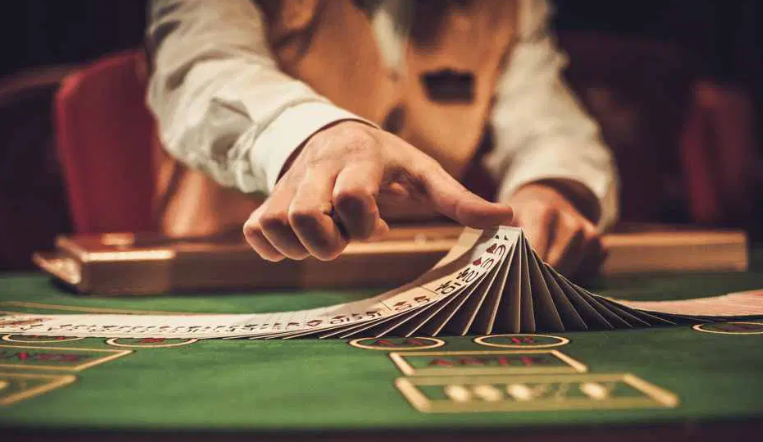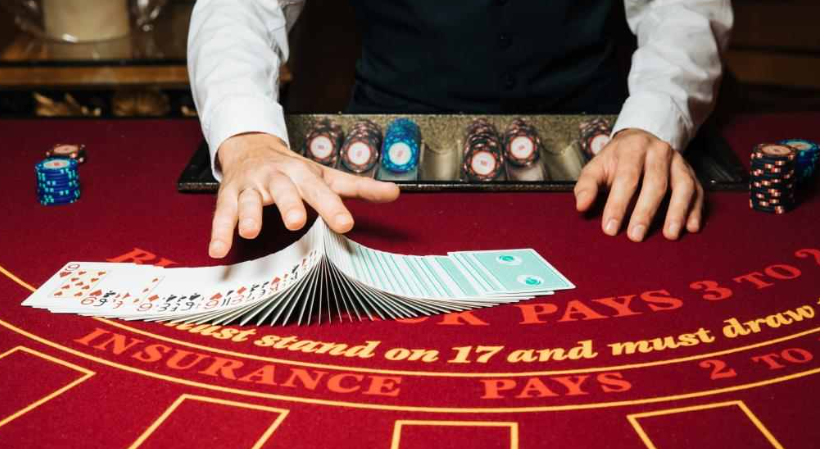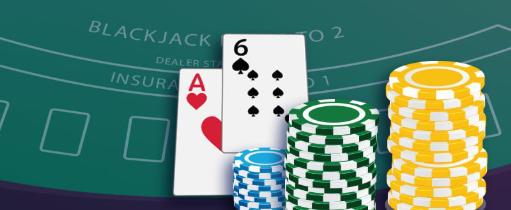Casino card games can shift dramatically with just one card, making it essential to be ready for any scenario. A great way to prepare is by familiarizing yourself with the fundamental rules of online casino games, including blackjack.
Understanding Blackjack Basics
New players gain confidence in blackjack once they grasp its core principles. Typically, the game begins when you buy in and receive your first two cards.
At this point, you must decide whether to adjust your wager and, if so, by how much. When your turn arrives, you can choose to hit (draw another card), stand (keep your current hand), or take more strategic actions like doubling down or splitting.
Your goal is to build a hand that comes closer to 21 than the dealer’s without exceeding that number. While there are various ways to achieve this, the dealer generally holds an advantage.
In certain situations, players may have the option to surrender or buy insurance—both strategies designed to minimize losses, though they still carry risk.
The Blackjack Surrender Rule
The surrender rule in blackjack allows players to recover part of a bet that appears to be a losing one. If you surrender, you receive half of your wager back.
Not all blackjack variations offer this option, and for those that do, surrender timing varies. The most common type, early surrender, must be executed before the dealer reveals their cards.
Late surrender, a less frequent option, occurs after the dealer’s cards are shown. However, if the dealer has a natural 21, surrendering is not an option.
Mathematically, surrendering can be a smart move in certain scenarios. For instance, if your hand totals 14, 15, or 16 (without being a pair) and the dealer’s upcard is a 10, surrendering may help limit your losses.
Blackjack Insurance Bets
Imagine you have two queens, feeling confident, but then the dealer’s face-up card is an ace. In an instant, your excitement turns to concern—there’s a high chance the dealer could have a blackjack.
In many blackjack versions, this is when players are given the option to buy insurance. This side bet allows you to reduce potential losses if the dealer gets a natural blackjack.
The cost of insurance is typically half of your original wager. If the dealer indeed has blackjack, your insurance bet pays out, though you lose your main bet. If the dealer doesn’t have blackjack, you forfeit the insurance bet, but play continues with your initial wager intact.
This is just one example of why understanding each game’s rules is crucial. Blackjack has numerous rules that can impact your strategy and gameplay.
The Rules of Splitting Pairs
Splitting in blackjack occurs when you receive two cards of the same value, such as a pair of eights. Knowing when to split, however, requires strategy.
Splitting divides your hand into two separate hands, doubling your bet but also increasing your potential winnings. This move can serve either a defensive or offensive purpose.
For example, if your pair consists of high-value cards that put you at risk of busting, splitting can provide a safer alternative. Conversely, if the dealer’s hand appears weak and you hold a lower pair, splitting can help you capitalize on the situation.
The Strategy Behind Splitting 8s in Blackjack
Would you like me to expand on splitting 8s or any other specific strategy?
Imagine you launch the app, choose your game, place your bet, and receive two eights as your starting hand. The general rule in this scenario is to always split them. Splitting 8s improves a statistically weak hand by creating two potentially stronger hands. As you gain experience, recognizing these strategic opportunities will become second nature.
Blackjack Double Down Rules
Many blackjack variations allow players to double down, but just because you have the option doesn’t mean you should always take it.
Before deciding when to double down, it’s important to understand what it entails. In most blackjack games, doubling down means increasing your original wager after seeing your first two cards.
In a traditional casino setting, this is done by placing an additional stack of chips equal to your initial bet. In live dealer or online blackjack games, you simply click or tap the “Double Down” button to make the move.
While doubling down can be a powerful strategy, it also doubles your risk. Conventional blackjack wisdom suggests doubling down when your starting hand totals 9, 10, or 11 without an ace. However, if the dealer’s face-up card is an ace or a total of 11, it’s usually best to avoid doubling down.
Compared to other blackjack side bets, doubling down presents more frequent opportunities.
The Five-Card Rule in Blackjack
Since blackjack is played with a fixed number of cards, certain outcomes have specific probabilities. One of the rarest is the five-card trick, also called the five-card Charlie rule.
This occurs when a player receives five cards without exceeding 21. Although hitting a five-card blackjack is possible, it’s extremely rare. Understanding the low probability of this event can help you react strategically if the situation arises.
Essential Blackjack Rules of Thumb
These fundamental blackjack rules cover common in-game scenarios. Here are additional tips to enhance your understanding and improve your chances of winning.
Know the Rules of Each Blackjack Variant
One of the most important blackjack principles is to familiarize yourself with the specific rules of the game you’re playing. Never assume that every casino or table follows identical rules.
While many blackjack fundamentals remain consistent across different versions, certain variations can significantly impact strategy. For example, some games offer the surrender option, but the timing and availability of this rule differ.
Another crucial factor to understand is the house edge in blackjack—this knowledge can influence your betting strategy.
Understanding the Blackjack House Edge
New players often misinterpret the term “house edge.” Some mistake it for their odds of winning or the probability of certain outcomes. In reality, the house edge represents the percentage of total wagers that the casino retains over time.
Even when a player wins, the house edge remains. Depending on the blackjack variant, house rules, and player skill levels, this percentage typically ranges between 0.5% and 4%.
Why is this important? A lower house edge means better potential returns for players. Keeping this in mind allows for smarter strategic decisions before you even place a bet.
Choosing the Right Blackjack Game for Your Goals
Before playing blackjack, take a moment to consider your objectives. Are you playing casually to pass the time? Are you looking for high-stakes action with big payouts? Or do you prefer a long-term strategy to steadily build your bankroll?
Your goals might vary from session to session, but identifying them will help you choose the right blackjack variant.
Online platforms offer multiple blackjack versions, each emphasizing different aspects of the game. Some feature unique mechanics, while others provide a more traditional experience. You’ll also need to decide whether you prefer a digital blackjack game or a live dealer experience.
Live Dealer Blackjack Rules
Would you like a breakdown of live blackjack rules and how they differ from digital versions?

Many players wonder what live dealer blackjack is all about. Simply put, it’s the closest you can get to playing at a real blackjack table without physically being in a casino.
While games like First Person Blackjack offer a near-live experience, live dealer blackjack takes it a step further. The only digital elements are your chips and interactions with the dealer or other players. The dealer is a real person, the table is physical, and actual cards are used.
To enhance the realism, the rules of live dealer blackjack are often identical or very similar to those found in land-based casinos. Players have the same strategic options they would in a traditional setting, ensuring an authentic casino experience.
Now, let’s explore one of the most fast-paced live blackjack variants: Speed Blackjack.
Speed Blackjack Rules
When it comes to Speed Blackjack, quick decision-making is key. This variant rewards players who react swiftly to the game.
Time Limit: You have a maximum of seven seconds to decide whether to hit, stand, or take other actions.
Priority System: If multiple players want a card, priority is given to the fastest responder.
Auto-Dealer Penalty: If you don’t make a decision in time, the game automatically places you on auto-dealer mode. However, you can preset this option before the game begins.
Player Options: Similar to other blackjack versions, Speed Blackjack allows players to take protective measures, such as insurance if the dealer shows an ace.
How Do Vegas Blackjack Rules Compare?
Casinos and game developers have continuously introduced creative variations of blackjack, leading to more standardized rules across different locations.
Even in Las Vegas, a gambling capital, blackjack rules can differ from one game to another. Not all blackjack tables follow the same guidelines, so it’s essential to understand the specific rules of the variant you’re playing.
How Blackjack Variants Impact the Rules
Each blackjack variant has unique rules that can affect gameplay and strategy. Whether playing online, in Vegas, or at a local casino, always check the specific game rules before you start betting.
Would you like insights on a particular blackjack variant?

Blackjack variations can range from subtle rule changes to major gameplay shifts, affecting everything from the pace of the game to the number of hands you can play at once. These rule adjustments influence strategy, odds, and available side bets.
For instance:
5 Hand Blackjack allows players to manage up to five hands simultaneously, increasing both risk and reward.
Blackjack Xchange adds a stock market-inspired twist, letting players trade cards to improve their hand.
Progressive Blackjack features jackpot-style side bets, offering the chance for massive payouts.
Understanding how these rule changes impact probabilities is essential.
For example, in multi-deck blackjack, the increased number of cards alters the likelihood of drawing specific hands. With more cards in play, the chances of hitting 21—or going bust—can shift significantly.
While these variations require extra strategic awareness, they also bring fresh excitement to the game. For players who prefer specific strategies, choosing the right variant can enhance their experience.
Smart Blackjack Playing Tips
To maximize your chances in any blackjack variant, understanding the game’s specific rules and probabilities is key. Would you like a breakdown of strategies for a particular version?



